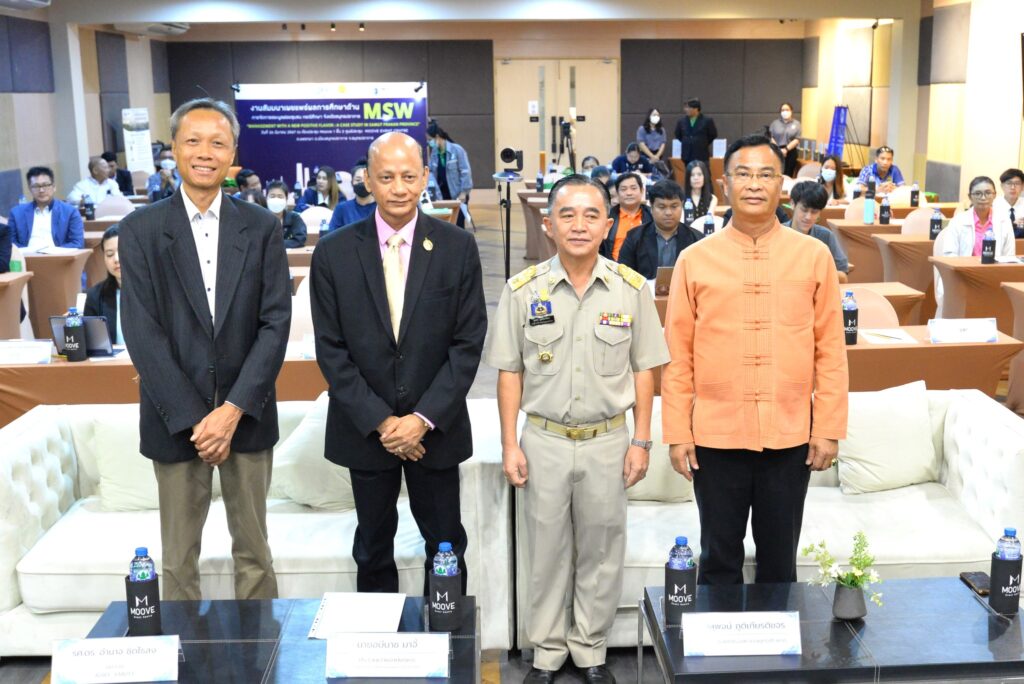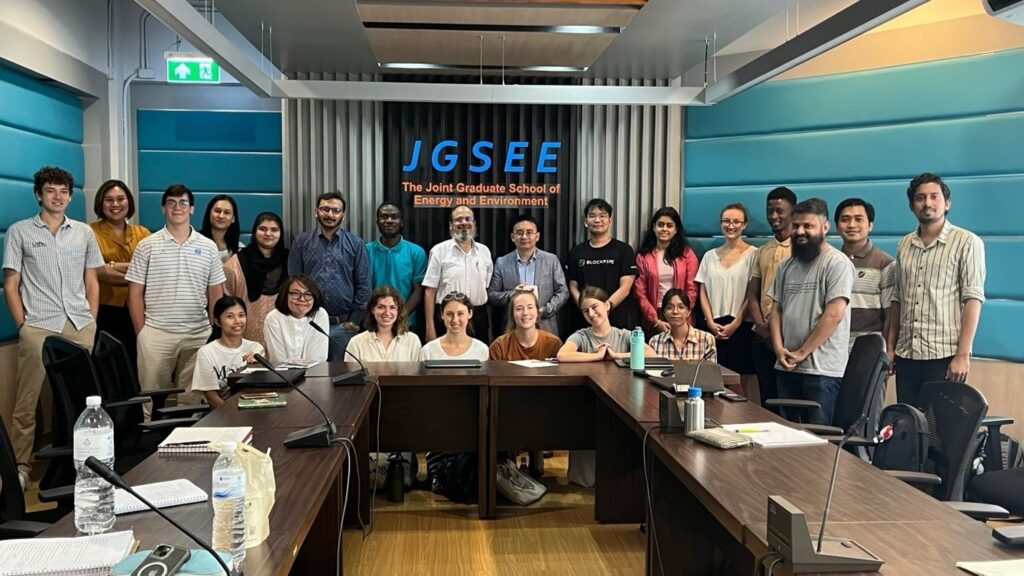Hub Net Zero and partners hosted a workshop on Agriculture Photovoltaics: System Design for Food and Energy Production on 24–25 April 2025. The event introduced agriculture photovoltaics (Agri-PV) as a promising approach to optimize land use for both food and clean energy production, supporting Thailand’s net zero ambitions. The workshop welcomed over 60 participants, comprising farmers, entrepreneurs, and members of academia.


Assoc. Prof. Dr. Suvit Tia, President of King Mongkut’s University of Technology Thonburi (KMUTT), delivered opening remarks, highlighting the potential of Agri-PV in contributing to national sustainability goals.
Ms. Munlika Sompranon, Director of the Division of Solar Energy Development at the Department of Alternative Energy Development and Efficiency (DEDE), shared updates on Thailand’s solar energy policy and its applications in agriculture. She highlighted DEDE’s initiatives such as solar pumps and solar greenhouse dryers already deployed in several provinces. DEDE is currently exploring Agri-PV and plans to introduce a dedicated policy to support its adoption.


Asst. Prof. Dr. Usa Boonbumrung from the Pilot Plant Development and Training Institute (PDTI), KMUTT, presented key technical considerations in the design of Agri-PV systems. Unlike conventional agriculture production, Agri-PV systems introduces shading and microclimatic changes that can either benefit or hinder crop growth, depending on the plant species involved. Therefore, careful design of parameters such as shading ratio, land equivalent ratio (LER), PV module layout, and planting distances is essential. Dr. Usa also highlighted ongoing KMUTT studies on Agri-PV applications for microalgae cultivation both in greenhouse and open-field settings.


Asst. Prof. Somkiat Tanta from Rajamangala University of Technology Lanna (RMUTL), discussed upstream aquaculture production and the opportunities and challenges for Agri-PV in this sector. He outlined the benefits of Agri-PV in aquaculture, including reducing water temperature, protecting aquatic animals from heat stress, minimizing evaporation, and generating clean energy to power water pumps and aerators. He noted the high potential of integrating Agri-PV into profitable yet underexplored upstream aquaculture operations.


Assoc. Prof. Dr. Chanulak Khanobdee also from RMUTL, presented on vegetable production technologies and the challenges of integrating Agri-PV. She emphasized the importance of plant science knowledge in system design, noting that Agri-PV affects light intensity and microclimate, which directly influence crop growth, yield, and quality. Careful consideration of crop physiology is essential to ensure balanced energy generation and sustainable crop production.
Dr. Kalyanee Paithoonrangsarid, currently seconded from the National Center for Genetic Engineering and Biotechnology (BIOTEC-NSTDA) to KMUTT, introduced collaborative research between BIOTEC and KMUTT on microalgae cultivation technology and its diverse applications—from food and feed to biofuels, wastewater treatment, and carbon sequestration. She also discussed the benefits and design considerations of integrating Agri-PV into microalgae production systems.
Dr. Kobsak Sriprapha from the National Electronics and Computer Technology Center (NECTEC-NSTDA) presented PV and Agri-PV research initiatives at NECTEC and shared results from Agri-PV installations at Sri Saengtham Temple in Ubon Ratchathani and NECTEC’s site in Pathum Thani.
Dr. Matthias Meier from Forschungszentrum Jülich GmbH, Germany, shared international perspectives on Agri-PV systems, highlighting research conducted in Germany involving crops such as soybean, spinach, and tomato. These studies were carried out both on experimental plots at the Jülich campus and on pilot production fields on RWE’s premises. He noted Thailand’s strong potential for Agri-PV given its agricultural economy and net zero ambitions.



The programme also featured a session by Mr. Titiwud Pongtanapaisan and Ms. Kanjana Prakopphon from PDTI, KMUTT, who showcased examples of commercial spirulina-based products and reviewed their global and Thai market trends. They highlighted notable growth in spirulina applications for animal and pet feed and discussed opportunities and challenges within Thailand’s animal feed market. In addition, Mr. Chutchai Ngamsom from Ch.TAWANVISAVAKIT, a solar solution provider, shared industry perspectives and showcased the company’s solar system installation projects.
On 25 April, participants visited technology showcases at KMUTT Bangkhunthien Campus, where they met with researchers to explore potential collaborations and technology transfer opportunities. Exhibits included microalgae cultivation systems, Agri-PV systems for microalgae cultivation, the Pilot Plant for Food Innovation, fermentation technologies, and spirulina-based products.









